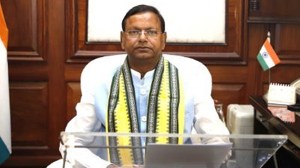Explained: What is Pakistan’s ‘draconian’ media law, and why is it being opposed?
A new law in Pakistan could jail social media users for up to five years for posting "fake news". What is this law, and why was it brought? Why is it being criticised?
 Pakistan's Prime Minister Imran Khan speaks during an interview in Islamabad, Pakistan. (Reuters Photo: Saiyna Bashir, File)
Pakistan's Prime Minister Imran Khan speaks during an interview in Islamabad, Pakistan. (Reuters Photo: Saiyna Bashir, File) The Imran Khan-led government in Pakistan has promulgated an ordinance to amend the Prevention of Electronic Crimes Act, 2016 (Peca) that could see social media users jailed for up to five years for posting “fake news”. The ordinance, viewed by the Opposition as an attempt to shield Pakistan’s army and judiciary from criticism, was swiftly adopted into law by President Arif Alvi on Sunday (February 20), a day after it was approved by Khan’s cabinet.
What is the Prevention of Electronic Crimes Act, 2016 or Peca?
The Act was originally legislated by the PML-N government led by prime minister Nawaz Sharif in 2016. The party had used its numerical majority in the National Assembly to push through the controversial bill amid protests by the Opposition and civil society organisations. According to Pakistan-based newspaper Dawn, the Act made it an offence to run a website or send information with a “counterfeit source”. Parody or satire-based websites and social media accounts also came under its ambit. It also granted authorisation to Federal officers to unlock any electronic device (mobile phones and computers) to investigate a crime.
What are the key amendments to Peca?
The incumbent government made Peca even more draconian, according to critics, by widening its ambit to cover state institutions such as the military and judiciary. And those charged under the ordinance cannot be granted bail for six months. The jail term has also been raised from three years to five for defaming any person or institution.
“The definition of a person has been expanded to include any company, association or body of persons whether incorporated or not, institution, organisation, authority or any other body established by the government under any law or otherwise,” Dawn reported.
The Prevention of Electronic Crimes (Amendment) Ordinance, 2022 also stipulates that courts will have to expedite trials in six months and submit monthly progress reports of any pending trial to the high court concerned stating reasons for the inability to conclude the matter. Further the complainant doesn’t necessarily be the aggrieved person or institution, it can be any member of the public, making the new law open for abuse.
The revised rules, according to Dawn, also include “content against Pakistan’s cultural and moral trends” as well as content that could “destroy” the morals and harm the mental and physical development of children. The rules would apply to all social media platforms including Facebook and Twitter, Law Minister Barrister Farogh Naseem said. As per the rules, social media companies would be required to set up offices in Pakistan within three months and appoint a compliance officer and grievance officer to address complaints within seven working days.
Why is it being opposed?
Pakistan’s Human Rights Commission, which called the legislation “undemocratic”, said “it will … inevitably be used to clamp down on dissenters and critics of the government and state institutions.”
Representatives of media and journalist organisations also called it a blatant attempt to curb freedom of expression, a space that is already shrinking in the country. They walked out from a meeting with officials of the Ministry of Information and Broadcasting and vowed to challenge the “draconian amendments” in court.
PML-N Vice President Maryam Nawaz, whose party passed the original bill, called it an attempt to “silence the media and the Opposition”. “Don’t say we didn’t warn you,” she said.
The PTI government, however, insisted that the amended law was primarily for a public figure or a public office holder and it would help curb fake news. Addressing the press, Law Minister Barrister Farogh Naseem said, “Suppose, fake news is spread about a veteran film actor named Nadeem. It’s not necessary that Nadeem himself should turn up to lodge a complaint. Instead, anyone can approach a relevant authority with a complaint and the case has to be wrapped up within six months under the law.”
Are there other laws that seek to protect state institutions?
The National Assembly had passed the Criminal Law (Amendment) Bill, 2020, that seeks to jail anyone who “ridicules or brings into disrepute or defames the military” for up to two years or impose a fine of up to Rs 5 lakh. The bill was introduced by a PTI lawmaker after Opposition leaders, especially former prime minister Nawaz Sharif, blamed the military for all the problems ailing the country.
Newsletter | Click to get the day’s best explainers in your inbox
- 01
- 02
- 03
- 04
- 05







































